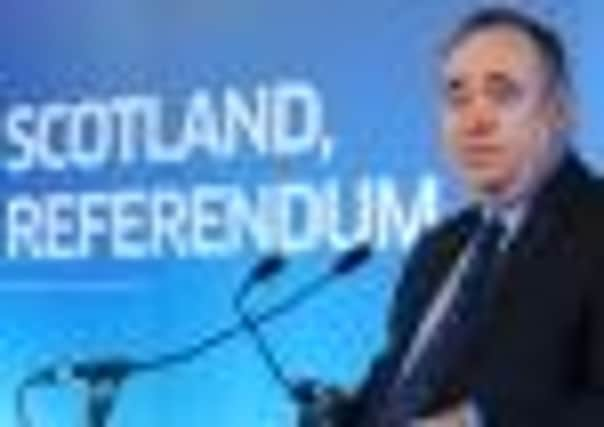Leaders: SNP must break its silence on legal advice over referendum


For those who govern us, or seek to govern us, what they say and how they say it matters. Not perhaps as much as what they do, but in terms of defining their political beliefs, their style, their attitudes, words are important.
It is, therefore, telling that Nicola Sturgeon, the Deputy First Minister, expounded very few words last night in her lecture at Glasgow University in answering the criticism of the SNP’s referendum policy made at the same venue in January by the UK’s most senior Scottish law officer, Advocate General Lord Jim Wallace. Mr Wallace claimed any referendum organised by Alex Salmond without a temporary transfer of powers to Holyrood would be undemocratic and illegal. He hinted he would go to the Supreme Court to stop an SNP poll if the Nationalists did not accept an offer to hand Holyrood the necessary powers to hold the vote.
Advertisement
Hide AdAdvertisement
Hide AdMs Sturgeon’s response to this was to say she did not “propose to talk in detail about the legal or technical arguments”, except to say that the SNP government was confident of the Scottish Parliament’s competence to hold an advisory referendum and cite some contested legal opinion backing that up. Ms Sturgeon then went on to repeat the SNP’s acceptance of an offer, set out by Lord Wallace, from Westminster to give it powers to hold a binding referendum.
In one respect it might be argued that, given this acceptance, Ms Sturgeon is justified in dismissing Lord Wallace’s case. Why waste time on an angels-on-the-head-of-a-pin constitutional argument when the referendum is likely to be held legally under Westminster powers? The answer is because her words, and the words of the SNP, matter. They give us insight into the Scottish Government’s policies.
By refusing to explain fully what was once a central plank of the SNP’s policy – its assertion that it had the power to hold a “consultative” referendum – Ms Sturgeon will hope to avoid scrutiny on this as the debate moves on. There may indeed be more important aspects of the SNP’s plans to create a separate Scotland, but its claims over its legal right to consult the people are important.
Why? A refusal to spell out in detailed plans leads to a suspicion that the SNP has merely asserted it has this right, while it has legal advice from civil servants to the contrary or which is ambiguous. If this is the case – and we cannot be sure because the SNP refuses to publish the advice – it casts doubt on the other assertions about an independent Scotland the party makes. Will Scotland really remain part of the European Union? Will the Bank of England happily underwrite our banks? Yes, say the Nationalists, but so far we have seen little of the advice they have received to justify these, and other, claims. Until we do we only have the say-so of politicians and who’d bet their shirt on that?
Museums a beacon of light amid gloom
With the debate over Scotland’s future dominating the headlines against a backdrop of economic uncertainty, Scots would be forgiven for concluding there is nothing else happening in this small nation. Thankfully, however, there is more to our national life than constitutional wrangling and the woe, woe and thrice woe school of economics.
One example is the remarkable success of our museums and galleries. The National Museum of Scotland has become the most popular UK attraction outside of London after attracting 1.45 million visitors last year – despite only reopening for half a year after its £46m refurbishment. It is not alone. The new transport museum in Glasgow has been showered with accolades. The refurbished National Portrait Gallery in Edinburgh is a wonder to behold. The Kelvingrove Gallery in Glasgow is attracting large numbers as are the RSA, the National Gallery, the Dean Gallery and the Gallery of Modern Art in the capital.
What they all have in common is the large sums of money spent on them – much from the Heritage Lottery Fund, but with significant contributions from private donations and the public purse – and clever, thoughtful displays which attract people of all ages, backgrounds and classes. As well as locals, hundreds of thousands of visitors come from outwith Scotland, bringing vital tourism income. Yesterday we reported on the worrying downside of poor service in some areas of tourism, but that is not the full story. Scotland’s museums and galleries are an outstanding asset which we should celebrate, recognise and support.
Holyrood opens itself to ridicule over farcical act
Proposed by the SNP Scottish Government and backed by the Liberal Democrats, Greens and independent Margo MacDonald, the Criminal Justice and Licensing (Scotland) Act passed in 2010 seemed a necessary piece of legislation that contained sensible plans to end short jail terms.
Advertisement
Hide AdAdvertisement
Hide AdHowever, there was devilish detail in this Holyrood act which has resulted in the ridiculous outcome of councillors being advised that small events such as poetry readings or informal music sessions or childrens’ art classes might have to have a council licence.
Sensible authorities such as Glasgow are to get round this pettifogging nonsense and Edinburgh councillors have backed down after pressure, but many others are swithering. It’s time for them to stop havering and act, not ignoring the law but interpreting it in a proportionate way. Difficult as the concept may seem, they should apply common sense. However, there are wider implications of this legislation. What does it say about the effectiveness of Holyrood as a legislative body at a time when more powers are inevitable whether there is an independence referendum or not? So much for freedom if Scotland is a country where you can’t organise, well, a poetry reading in a library – or at least not without a licence.